浙江省临海市白云高级中学2017-2018学年高二上学期期中考试英语试题
2017-2018学年高二英语上学期期中试题_15
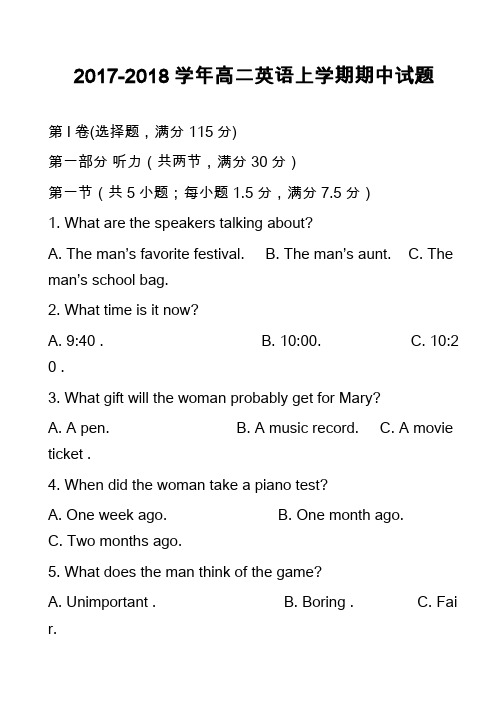
2017-2018学年高二英语上学期期中试题第I卷(选择题,满分115分)第一部分听力(共两节,满分30分)第一节(共5小题;每小题1.5分,满分7.5分)1. What are the speakers talking about?A. The man’s favorite festival.B. The man’s aunt.C. The man’s school bag.2. What time is it now?A. 9:40 .B. 10:00.C. 10:20 .3. What gift will the woman probably get for Mary?A. A pen.B. A music record.C. A movie ticket .4. When did the woman take a piano test?A. One week ago.B. One month ago.C. Two months ago.5. What does the man think of the game?A. Unimportant .B. Boring .C. Fai r.第二节(共15小题;每小题1.5分,满分22.5分)听第6段材料,回答第6、7题。
6. Where are the dictionaries?A. On the top shelf.B. At the bottom of the shelf.C. On the second shelf from the top.7. What does the man need?A. Books on grammar.B. Books for conversation practice.C. Books for reading practice.听第7段材料,回答第8至9题。
8. How many classes does the woman have this afternoon?A. Two.B. Three.C. Four.9. What will the man be doing at 5:00 this afternoon?A. Having a meeting.B. Having a class.C. Talki ng to his secretary.听第8段材料,回答第10至12题。
2017-2018学年高二英语上学期期中试题_20
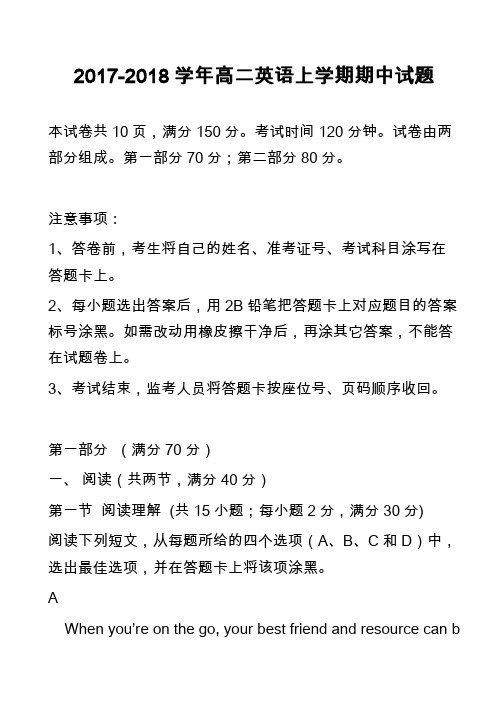
2017-2018学年高二英语上学期期中试题本试卷共10页,满分150分。
考试时间120分钟。
试卷由两部分组成。
第一部分70分;第二部分80分。
注意事项:1、答卷前,考生将自己的姓名、准考证号、考试科目涂写在答题卡上。
2、每小题选出答案后,用2B铅笔把答题卡上对应题目的答案标号涂黑。
如需改动用橡皮擦干净后,再涂其它答案,不能答在试题卷上。
3、考试结束,监考人员将答题卡按座位号、页码顺序收回。
第一部分(满分70分)一、阅读(共两节,满分40分)第一节阅读理解 (共15小题;每小题2分,满分30分)阅读下列短文,从每题所给的四个选项(A、B、C和D)中,选出最佳选项,并在答题卡上将该项涂黑。
AWhen you’re on the go, your best friend and resource can be your phone. In the age of smart phones, apps are like guiding stars: They can point you in the right direction for a hotel, lis t expenses, send postcards, and much more. When used tog ether, these apps can be the basic travel tool, placing a wealt h of information at your fingertips no matter where you are on the planet. U.S. News Travel has picked the essential travel a pps, known for their utility and reliability. Best of all, they cost absolutely nothing.Trip ItYour Personal Travel AgentBe your own travel agent and plan every detail of your trip—from car rental to accommodating restaurants—with Trip It. You can make travel schedule by hand, or simply forward the email confirmations of your flight, rental car, train t ickets, and hotels to plans.Weather FreeYour Go-To Meteorologist(气象学者)Stop trying to explain the weather forecast on the evening ne ws (particularly when it’s in a foreign language). The Weather Free app informs you (in English) of the climate in various loc ations. It features the local weather, and other key factors thatwill inform your decision about what to wear before stepping outside.GobyYour Event GuruWhen you're in a foreign city, you sometimes look around and ask: Where are all the people? Goby has the answer. This ap p pinpoints the neighborhood hot spots (including museums, hotels, eateries, and more) in your neighborhood. But its true value comes in finding nearby events. You'll discover concerts , plays, and more right around the corner.1. What is the advantage of using travel apps picked by the U. S. News Travel?A. They can solve any problem you come across.B. They reduce your travel budget.C. They exercise your fingertips.D. They are reliable and free of charge.2. With the help of the travel apps used together, travelers ca n do the following things EXCEPT .A. rent a carB. decide what to wearC. look for a friend while travelingD. find the nearby museums3. Where are the readers likely to read the passage above?A. In a geography textbookB. In a scienc e and technology magazineC. On a popular websiteD. In a business rep ortBTim Richter and his wife, Linda, had taught for over 30 years near Buffalo, New York – he in computers, she in special edu cation. “Teaching means everything to us,” Tim would say. In April 1998, he learned he would need a heart operation. It wa s the kind of news that leads to some serious thinking about lif e’s purpose.Not long after the surgery, Tim saw a brochure describing Ima gination Library, a program started by Dolly Parton’s foundatio n (基金会) that mailed a book every month to children from birth to ag e five in the singer’s hometown of Sevier, Tennessee. “I thoug ht, maybe Linda and I could do something like this when we r etire,” Tim recalls. He placed the brochure on his desk, “as a r eminder.”Five years later, now retired and with that brochure still on thedesk, Tim clicked on . The program ha d been opened up to partners who could take advantage of b ook and postage discounts.The quality of the books was of great concern to the Richters. Rather than sign up online, they went to Dollywood for a look-see. “We didn’t want to give the children rubbish,” says Linda. The books – reviewed each year by teachers, literacy speciali sts and Dollywood board members – included classics such a s Ezra Jack Keats’s The Snowy Day and newer books like An na Dewdney’s Llama Llama series.Satisfied, the couple set up the Richter Family Foundation and got to work. Since 2004, they have shipped more than 12,200 books to preschoolers in their area. Megan Williams, a mot her of four, is more than grateful: “This program introduces us to books I’ve never heard of.”The Richters spend about $400 a month sending books to 2 00 children. “Some people sit there and wait to die,” says Tim.“Others get as busy as they can in the time they have left.”What did Tim want to do after learning about Imagination Libr ary?A. Give out brochures.B. Do something similar.C. Write books for childrenD. Retire from being a teacher.According to the text, Dollly Parton is .A. a well-known surgeonB. a mother of a four-year-oldC. a singer born in TennesseeD. a best-selling authorWhy did the Richters go to Dollywood?A. To avoid signing up online.B. To meet Dollywood board members.C. To make sure the books were the newest.D. To see if the books were of good quality.What can we learn from Tim’s words in the last paragraph?A. He needs more money to help the children.B. He wonders why some people are so busy.C. He tries to save those waiting to die.D. He considers his efforts worthwhile.CHave you ever found yourself in this situation: You hear a son g you used to sing when you were a child – a bit of nostalgia(怀旧) or “blast from the past,” as we say. But it is not a distant childhood memory. The words come back to you as clearly as when you sang them all those years ago.Researchers at the University of Edinburgh studied the rela tionship between music and remembering a foreign language. They found that remembering words in a song was the best way to remember even one of the most difficult languages.Here is what they did. Researchers took 60 adults and rand omly divided them into three groups of 20. Then they gave the groups three different types of “listen-and-repeat” learning conditions. Researchers had one group simpl y speak the words. They had the second group speak the wor ds to a rhythm, or beat. And they asked the third group to sing the words.All three groups studied words from the Hungarian languag e for 15 minutes. Then they took part in a series of language t ests to see what they remembered.Why Hungarian, you ask? Researchers said they chose Hu ngarian because not many people know the language. It does not share any roots with Germanic or Romance languages, s uch as Italian or Spanish. After the tests were over, the singer s came out on top. The people who learned these new Hunga rian words by singing them showed a higher overall performa nce. They did the best in four out of five of the tests. They also performed two times better than those who simply learned t he words by speaking them.Dr. Katie Overy says singing could lead to new ways to lear n a foreign language. The brain likes to remember things whe n they are contained in a catchy 3, or memorable 4, tune 5. Dr. Ludke said the findings could help those who struggle to l earn foreign languages. On the University of Edinburgh’s web site Dr. Ludke writes, “This study provides the first experiment al evidence that a listen-and-repeat singing method can support foreign language learning, and opens the door for future research in this area.”8. The “song” mentioned in the first paragraph is intended to .A. recall the pastB. attract the readersC. introduce the topicD. compare the childh ood with the present9. According to the passage which language doesn’t share the same root with Germanic or Romance languages?A. HungarianB. SpanishC. ItalianD. English10. Based on the last two paragraphs, we can conclude thatA. singing is the best way to learn a language.B. the brain probably works best when the foreign language le arners sing the words.C. a listen-repeat method is very effective for any language learner.D. Dr. Katie Overy and Dr. Ludke disagree with each other.11. In which situation can the finding of the research be applie d?A. A mother is going to teach her baby how to speak.B. A child is going to have his first music lesson.C. A student is going to learn a new English song.D. An American is going to learn some Chinese.DIn my generation, most people assume. We assume that after getting a driver’s license, we should see a brand new car sitti ng in our driveway. We assume that the latest iPhone product should be in our hands as soon as something goes wrong wit h our old one. We also assume that college, being as expensi ve as it is, is given. However, what we don’t realize is that all of these things are very special privileges.New cars, the latest technology and college fees are somethi ng that most people have in the place where I live. I’m not necessarily complaining about this. I live in a very fortunate area, and I try to remind myself of that every day.Getting nice things is great, but sometimes, the competition th at rules our lives gets too fierce. When someone else gets so mething great, you begin to think, “Why can’t I have that?” Wh en everyone around you goes to college, you think that one d ay you will obviously do the same, because who doesn’t? Even now, being almost done with my first year of college, I c onstantly see people who forget why we’re here, and how luc ky we are to be on this campus. All of the distractions can sur ely keep you from doing your best, and they can easily make you forget your real purpose at college. The parties, friends, e vents, and overall social life can move you into a never-ending whirlpool (旋涡)of not doing schoolwork. Having fun is a part of life, but balan ce is the key when it comes to college.Appreciation nowadays is slowly fading into a distant thought. We constantly forget how lucky we are to have the things and the life that we do. Surely, who doesn’t dream of a new car w aiting for them, or that brand new iPhone that you see in all of the commercials? But wanting something is different from ex pecting it. Setting yourself up with an “I should get this” attitud e will only push appreciation further away.Appreciate what you have, but don’t expect what you don’t ha ve. Say thank you to those who help and support you, and rea lize that whoever you are, you’re lucky in a great way.12. Which of the following may the author agree with?A. Assuming should be forbidden.B. People of his generation are lazy.C. What we have may be privileges.D. College education shouldn’t be expensive.13. What do we know about the author?A. He is too poor to afford a new car.B. He is sure that everyone can go to college.C. He is a fortunate second-year student.D. He is grateful for his college education.14. What does the author think of the social activities at colleg e?A. They should be balanced in students’ life.B. They are totally a waste of time and money.C. They make students confused about their life.D. They are useful for students after graduation.15. According to the fifth paragraph, people nowadays .A. don’t expect new cars or cell phonesB. don’t seem to appreciate what they haveC. always set up big goals in lifeD. often complain they are unlucky第二节(共5小题;每小题2分,满分10分)根据短文内容,从短文后的选项中选出能填入空白处的最佳选项。
2017-2018学年高二英语上学期期中试题_38
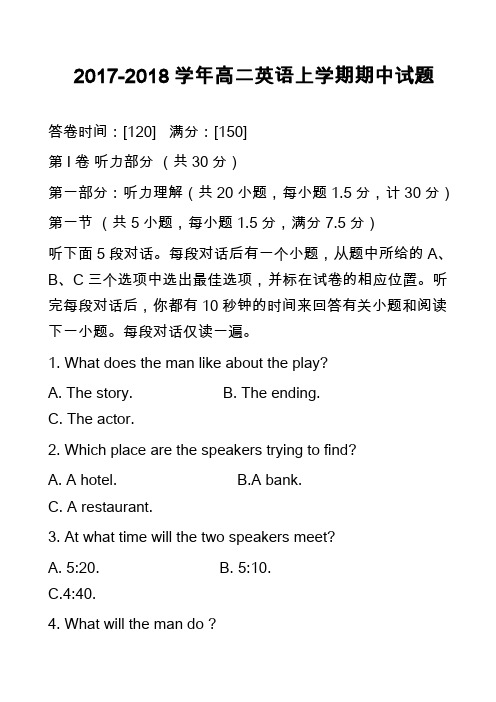
2017-2018学年高二英语上学期期中试题答卷时间:[120] 满分:[150]第I卷听力部分(共30分)第一部分:听力理解(共20小题,每小题1.5分,计30分)第一节(共5小题,每小题1.5分,满分7.5分)听下面5段对话。
每段对话后有一个小题,从题中所给的A、B、C三个选项中选出最佳选项,并标在试卷的相应位置。
听完每段对话后,你都有10秒钟的时间来回答有关小题和阅读下一小题。
每段对话仅读一遍。
1. What does the man like about the play?A. The story.B. The ending.C. The actor.2. Which place are the speakers trying to find?A. A hotel.B.A bank.C. A restaurant.3. At what time will the two speakers meet?A. 5:20.B. 5:10.C.4:40.4. What will the man do ?A. Change the plan.B. Wait for a phone call.C. Sort things out.5. What does the woman want to do ?A. See a film with the man.B. Offer the man some help.C. Listen to some great music.第二节(共15小题:每小题1.5分,满分22.5分)请听下面5段对话。
每段对话后有几个小题,从题中所给出的A、B、C三个选项种选出最佳选项,并标在试卷的相应位置。
听每段对话前,你将有时间阅读各个小题。
,每小题5秒钟;听完后,各小题给出5秒钟的作答时间。
每段对话读两遍。
听第6段材料,回答6、7题。
6. Where is Ben?A. In the kitchen.B. At school.C. In the park.7. What will the children in the afternoon?A. Help set the table.B. Have a party.C. Do their homework.听第7段材料,回答第8、9题8. What are the two speakers talking about?A. A Family holiday.B. A business trip.C. A travel plan.9. Where did Rachel go?A. Spain.B. Italy.C. China.听第8段材料,回答第10至12题。
2017—2018学年度第一学期期中考试高二年级英语试题
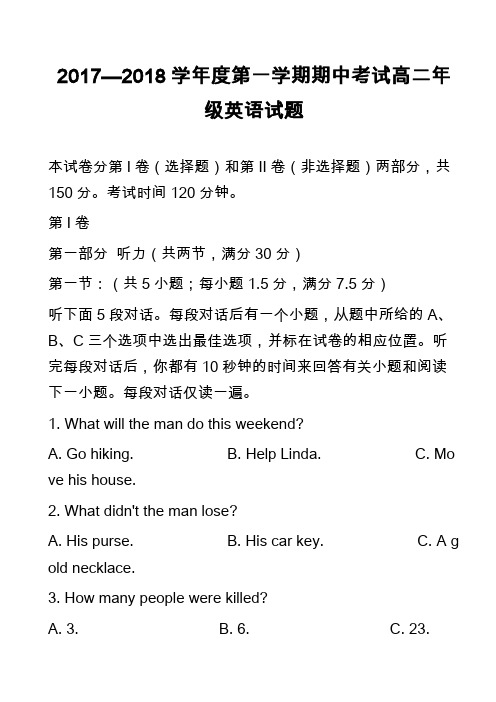
2017—2018学年度第一学期期中考试高二年级英语试题本试卷分第I卷(选择题)和第II卷(非选择题)两部分,共150分。
考试时间120分钟。
第I卷第一部分听力(共两节,满分30分)第一节:(共5小题;每小题1.5分,满分7.5分)听下面5段对话。
每段对话后有一个小题,从题中所给的A、B、C三个选项中选出最佳选项,并标在试卷的相应位置。
听完每段对话后,你都有10秒钟的时间来回答有关小题和阅读下一小题。
每段对话仅读一遍。
1. What will the man do this weekend?A. Go hiking.B. Help Linda.C. Mo ve his house.2. What didn't the man lose?A. His purse.B. His car key.C. A g old necklace.3. How many people were killed?A. 3.B. 6.C. 23.4. What is the woman's neighbor like?A. Friendly.B. Polite.C. Unkind.5. How long is the library open on weekends?A. For seven hours.B. For eight hours.C. For nine hours.第二节:(共15小题;每小题1.5分,满分22.5分)听下面5段对话或独白。
每段对话或独白后有几道小题,从每题中所给的A、B、C三个选项中选出最佳选项。
听每段对话或独白前,你将有5秒钟的时间阅读每小题,听完后,每小题将给出5秒钟的作答时间。
每段对话或独白读两遍。
听下面一段对话,回答第6和第7两个小题。
6. What's wrong with the boy?A. His leg got hurt.B. His head got hurt.C. His arm got hurt.7. Who was driving the car when the accident happened?A. The boy.B. The boy's mother.C. Th e boy's father.听下面一段对话,回答第8和第9两个小题。
2017-2018学年第一学期高二英语期中考试答案

2017-2018学年度第一学期高二级英语科期中考试答案一、听力(满分15分)1-5 ACABB 6-10 BACBC二、单项选择(满分10分)11-15 ACCAA 16-20 BAACA21-25 DDCDD26-30 CACBA三、完型填空(满分30分)31-35 CBBAD 36-40 CDCAB 41-45 DBACD 46-50 BACAD四、阅读理解(共20小题,满分35分)第一节(共15小题,每小题2分,共30分)51-53 DBC 54-57 ACBC 58-61 CBAD 62-65 ADBC第二节七选五(共5小题,每小题1分,共5分)66 A 67AB 68AD 69B 70 D第二部分非选择题(共65分)第一部分:第二节听取信息(共5小题,每小题1分,共5分)1. back and forth2. someone to approach3. parallel to4. description of animals5. a right angle一、根据句意和提示,填单词 (共30小题,每小题0.5分,满分15分)1. recognized2. concerned3. destroyed4. trapped5. outdoors6. survived7. appearance8. employs9. graduates 10. intelligence11. apologize 12. permission 13. pavement 14. admired 15. remind16. linked 17. blaming 18. conflict 19. typists 20. manufacturing21. denying 22. concentrate 23. assess/evaluate 24. acquire(d) 25. complex26. accurate 27. Polishing 28. geniuses 29. farewell 30. revealing二、根据句意和提示,填词组 (共10小题,每小题1分,满分10分)1. be broken up2. out of work3. in debt4. stare at5. make sense6. To her credit7. make a difference8. physical contact9. are mirrored by 10. are thoroughly spoiled三、根据中文及括号内的提示翻译句子(共10小题,每小题2分,满分20分)1. The world’s fresh water resources are very limited so we must make good use ofthem.2. She insisted that she (should) organize the trip properly.3. He talked so rudely to his boss. No wonder he was fired.4. Passengers are not allowed to smoke in the waiting room.5. She is a talented musician as well as a photographer.6. It is a well known fact that cigarettes contain many chemicals that will affect your health.7. Unless you keep a balanced diet, you will put on weight.8. It seems that global warming could be to blame for some natural disasters.9. I keep my reference books near my desk for convenience.10. You should cut off the electricity supply to prevent the fire from spreading.四、写作(满分15分)Born in Shanghai in 1969, Lvqiu Luwei, a famous journalist with her English name Rose, is about 165cm in height. After getting a bachelor’s degree of Philosophy at Fudan University in 1992, she settled in Hongkong in 1995. Two years later she joined Phoenix Television and became one of the first experienced TV journalists. Enthusiastic about her job, she concentrated her attention on journalism, covering and reporting many major international events. Lvqiu was the first Chinese female reporter to cover the Iraq war in 2003, which was even spoken highly of by President Hu Jintao.听力文本Conversation 1M: Hello. Matt Ellis speaking.W: Hello, Dr. Ellis, my name’s Pan Johnson. My roommate, Janet Holmes, wanted me to call you. M: Janet Holmes? Oh,that’s right. She’s in my Shakespearean English class. Has anyt hing happened to her?W: Nothing, it’s just that she submitted a job application yesterday and the company asked her in for an interview today. She’s afraid she won’t be able to attend your class this afternoon though. I’m calling to see whether it would be OK if I gave you her essay. Janet said it’s due today.M: Certainly, that would be fine. Uh, you can either drop it off at my class or bring it to my office. W: Would it be all right to come by your office around 4:00? I’m afraid I can’t come any earli er because I have three classes this afternoon.M: Uh, I won’t be here when you come. I’m supposed to be at a meeting from 3:00 to 6:00, but how about leaving it with my secretary? She usually stays until 5:00.W: Fine, please tell her I’ll be there at 4:00. And Dr. Ellis, one more thing, could you tell me where your office is? Janet told me where your class is, but she didn’t give me directions to your office.M: Well, I’m in Room 302 of the Gregory Building. I’ll tell my secretary to put the paper in m y mail box, and I’ll get it when I return.W: I sure appreciate it. Goodbye, Dr. Ellis.M: Goodbye, Ms. Johnson.Conversation 2W: Hi, Eric. How was your weekend?M: Great! I met Maria’s parents. And we told them we want to be engaged.W: Eric, that’s wonderful. Congratulations!M: Thanks, Alice. I really like her parents too. They're very nice. Mrs. Carmona speaks four languages, and Mr. Carmona is a diplomat. In fact, he gave a speech at the law school on Saturday morning.W: Oh, that was Maria’s father? I heard his speech.M: You did?W: Well, I heard part of it. I listened to it for ten minutes and then I fell asleep. I thought I was inclass. Anyway, tell me about your weekend.M: Saturday evening we saw a play. And Sunday afternoon, we watched a soccer game. Then Sunday night we all went out for dinner, Maria, her parents and me. That was the first chance we had to talk.W: Were you nervous?M: At first I was. We didn’t say much. Mr. Carmona told us some good stories about his experiences as a diplomat. And he asked me about my hobbies.W: And what did you say?M: Well, I didn’t tell him about my flying lessons. I told him about my chess playing and my classical music collection.W: Good idea. Her parents really approve of you, don’t they?M: I guess so. Maria called this morning and said: “My father told me he’d like you for a son-in-law right now.”W: That’s great.M: Not exactly. I want to get married after graduate school in about three years.Conversation 3M: You're going to wear out the computer’s keyboard.W: Oh. Hi.M: Do you have any idea what time it is? W: About 10:00 or 10:30?M: It’s nearly midnight. W: Really? I didn’t know it was so late.M: Don’t you have an early class to teach tomorrow morning?W: Yes, at 7:00. My commuter class—the students who go to work right after their lesson.M: Then you ought to go to bed. What are you writing anyway?W: An article I hope I can sell.M: Oh, another of your newspaper pieces. What’s this one about?W: Do you remember that trip I took last month? M: The one up to the Amazon?W: Well, that’s what I’m writing about. The new highway and the changes it’s making in the Amazon valley.M: It should be interesting.W: It is. I guess that’s why I forgot all about the time.M: How many articles have you sold now?W: About a dozen so far.M: What kind of newspapers buy them?W: The papers that carry a lot of foreign news. They usually appear in the big Sunday editions where they need a lot of background stories to help fill up the space between the ads.M: Is there any future in it?W: I hope so. There's a chance I may sell this article to a news service.M: Then your story would be published in several papers, wouldn't it?W: That’s the idea. And it might even be able to do other stories on a regular basis.M: That would be great.LectureAmong the kinds of social gestures most significant for second-language teachers are thosewhich are identical in form but different in meaning in the two cultures. For example, a Colombian who wants someone to approach him often signals with a hand movement in which all the fingers of one hand, cupped, point downward as they move rapidly back and forth. Speakers of English have a similar gesture though the hand may not be cupped and the fingers may be held more loosely, but for them the gesture means goodbye or go away, quite the opposite of the Colombian gesture. Again, in Colombia, a speaker of English would have to know that when he indicates height he must choose between different gestures depending on whether he is referring to a human being or an animal. If he keeps the palm of the hand parallel to the floor, as he would in his own culture when making known the height of a child, for example, he will very likely be greeted by laughter; in Colombia this gesture is reserved for the description of animals. In order to describe human beings he should keep the palm of his hand at a right angle to the floor. Substitutions of one gesture for the other often create not only humorous but also embarrassing moments. In both of the examples above, speakers from two different cultures have the same gesture, physically, but its meaning differs sharply.。
2017~2018学年第一学期高二英语期中试题

2017~2018学年第一学期高二英语期中试题第一部分听力(共两节,满分15分)第一节(共5小题;满分2.5)听下面5段对话。
听完每段对话后,你都有10秒钟的时间来回答有关小题和阅读下一小题。
每段对话仅读一遍。
1.What does the woman suggest?A. Waiting on the corner.B. Taking a taxi.C. Calling the hotel.2.Where are the speakers?A. At home.B. In a flower shop.C. At school.3.What will the man probably do?A. Have dinner.B. Clean the table.C. Read the notebook.4.How many countries has the woman been to so far?A. Four.B. Three.C. Two.5.When does the bakery close?A. At 7:00.B. At 6:55.C. At 7:30.第二节(共15小题;满分12.5分)听下面5段对话或独白。
听每段对话或独白前,你将有时间阅读各个小题,每小题5秒钟;听完后,各个小题将给出5秒钟的作答时间。
每段对话或独白读两遍。
听第6段材料,回答第6~7小题。
6.How old is the daughter?A. Two years old.B. Three years old.C. Four years old.7.What’s the matter with the woman’s daughter?A. She is ill.B. She has a fever.C. She drank some ink.听第7段材料,回答第8~9小题。
8.What does the man want?A.A pair of brown size 4 shoes.B.A pair of black size 6 shoes.C.A pair of brown size 6 shoes.9.What kind of shoes will the man bring home?A. The shoes he has planned to buy.B.A pair of brown sho es in a different size.C.A pair of black size 6 shoes.听第8段材料,回答第10~12小题。
2017~2018学年度第一学期高二年级期中考试英语试题
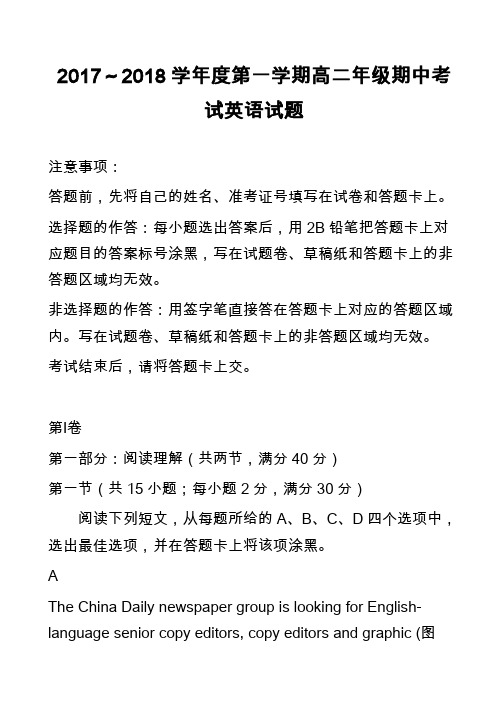
2017~2018学年度第一学期高二年级期中考试英语试题注意事项:答题前,先将自己的姓名、准考证号填写在试卷和答题卡上。
选择题的作答:每小题选出答案后,用2B铅笔把答题卡上对应题目的答案标号涂黑,写在试题卷、草稿纸和答题卡上的非答题区域均无效。
非选择题的作答:用签字笔直接答在答题卡上对应的答题区域内。
写在试题卷、草稿纸和答题卡上的非答题区域均无效。
考试结束后,请将答题卡上交。
第Ⅰ卷第一部分:阅读理解(共两节,满分40分)第一节(共15小题;每小题2分,满分30分)阅读下列短文,从每题所给的A、B、C、D四个选项中,选出最佳选项,并在答题卡上将该项涂黑。
AThe China Daily newspaper group is looking for English-language senior copy editors, copy editors and graphic (图表) designers to strengthen its international team. We offer a competitive salary package, free accommodation(膳宿)with utilities(公用事业)paid for 90 percent medical return, a seven-day paid leave, eleven-day public holidays and a return ticket to the country of reside nce.Senior Copy EditorYou must:*work on shifts in the Business Desk and usually have the last word before the page is sent to print;*edit or rewrite copy and give up-to-date headlines and captions(字幕);*have had at least two years’ editing experience working on ed iting desks and be familiar with industry software.Copy EditorYou must:*be good at editing or rewriting copy and writing snappy headli nes and captions;*be able to work on shifts for different pages, and usually have the last word before the page is sent to print;*have two years of editing experience working on copy desks a nd be familiar with industry software.Graphic DesignerYou must:*have excellent skills in information graphics;*be good at illustrations and freehand drawings;*be experienced in newspaper or magazine layouts;*have a good sense of typography;*have good news judgment;*be familiar with Macintosh software, including InDesign, Illustr ator and Photoshop;*be fluent in English.For enquiries, write to job@chinadaily. com. cn.1. What’s the meaning of the underlined words“ have the last word” in the third paragraph?A. Showing that the editor is forgetful.B. Showing that the editor has the right to make a decision.C. Meaning the editor is good at making a speech.D. Meaning the editor is bored with his work.2. What is not required about Graphic Designer?A. Be familiar with Photoshop.B. Have excellent skills in information graphics.C. Having a good sense of typography.D. Writing up-to-date headlines and captions.3. The author writes this passage to .A. advertise for employing some employeesB. describe the positions of the China Daily newspaper groupC. describe the working conditions of the China Daily newspa per groupD. tell you how to become good editors and designersBIn our home it was natural to fear our father. Even our mother was afraid of him. As children, my sister and I thought every f amily was like that—that every family had an unpredictable dad who was impossibl e to please and a praying mom who was there to protect the children. We were good children. Mom was always telling us w e were, even if daddy couldn’t see it.Then came the day we found something new and fun to do. We discovered we could draw pictures with chalk on our woo den front door. We could have lots of fun, so we set to work dr awing and making lots of pretty pictures all over it. We had a great time. We decided to finish our pictures, knowing Mom w ould just love them.The praise we expected did not come. We did not understand why, but we knew our parents were angry, and that we were i n big trouble!Off we ran to find a place to hide. In our wooded yard it was n ot hard for two small children to find safety. Together, we hid behind a tree and did not move. Soon we heard the frightened voices of Mom and our neighbors calling out to us. We were afraid we would be found. The sun set, and it began to get dar k, we heard another voice, one we recognized with great fear: our daddy. But there was something strangely different about it. In it we heard something we had never heard before: fear and despair. Our daddy with tears running down his face, pra yed to God for the safe return of his girls.[]Things were different after that. We had a new daddy; it was a s if the old one had been buried that day in the yard. Our whole family had been changed by one piece of chalk.4. The children drew pictures on the wooden front door in ord er to .A. improve their drawing skillsB. be praised by their moth er.C. make the door beautifulD. have fun5. Why didn’t the children come out when others were searchi ng for them?A. They were afraid of being punished.B. They wanted to make their father worry.C. They wanted to tell their parents that they were wrong.D. They wanted to stay there for the night.6. What happened while the children were hiding?A. The mother told the neighbors about it.B. The father came home early.C. The father became very angry.D. The children found it was interesting to do so.7. What can we infer from the passage?A. The father didn’t love his children.B. The father was too busy to talk with the children.C. The children weren’t afraid of their father after the incident.D. The family was afraid of the father because of his rudene ss.CHappy birthday! Do birthdays really make people happy? Of c ourse they do. Birthdays celebrate the day we were born. Bes ides, that extra candle on the cake suggests another year of g rowth and maturity—or so we hope. We all like to imagine that we’re getting wiser and not just older. Most of us enjoy seeing the miracle of grow th in others, as well. For instance, seeing our children develop and learn new things makes us feel proud. For Americans, lik e people in most cultures, growing up is a wonderful process. But growing old? That’s a different story.Growing old is not exactly pleasant for people in youth-oriented American culture. Most Americans like to look young, act young and feel young. As the old saying goes, “You’re as young as you feel.” Older people joke about how many years young they are, rather than how many years old. People in so me countries value the aged as a source of experience and wi sdom. But Americans seem to favor those that are young, or at least “young at heart”.Many older Americans find the “golden years” to be anything but golden. Economically, “senior citizens” often struggle just t o get by. Retirement at age 65 brings a sharp decrease in per sonal income. Social security benefits usually cannot make up the difference. Older people may suffer from poor nutrition, m edical care and housing. Some even experience age discrimi nation (歧视). In 1987, American sociologist Pat Moore dressed up like an older person and wandered city streets. She was often tre ated rudely—even cheated and robbed. However, dressed as a young pers on, she received much more respect.Unfortunately, the elderly population in America is increasing f ast. Why? People are living together. Fewer babies are being born. And middle-aged “baby boomers” are rapidly entering the groups of the el derly. America may soon be a place where wrinkles (皱纹) are “in”. Marketing experts are already noticing this group of consumers (消费者).8. The main ideaof the third paragraph is________.A. the golden years can make the old earn lots of moneyB. many old people in America are leading a hard lifeC. the old in America have to retire at the age of 65D. American social security benefits are not good9. From the last paragraph we know that the underlined word “in” can be replaced by________.A. seriousB. badC. disappearing slowlyD. growing fast10. From this passage we can know________.A. in America, growing up is not a wonderful processB. in America, growing up is as wonderful a process as gro wing oldC. in America, growing up is a wonderful process, while gro wing old is notD. in America, growing old is a wonderful process, while gro wing up is not11. What should be mentioned in the following paragraph?A. The public will change their attitudes towards old people.B. People will provide more services to the old in their com munities.C. Companies will soon produce more goods for old Americ ans.D. The government will pass laws to ensure the benefits of t he people.DNothing is more tiresome than being stuck in a boring class. E very second takes ages to tick by. A recent survey of America n kids revealed that 91 percent experience boredom. In fact, a dolescence is considered a peak period for the problem. One study showed that roughly one in three teenagers was bored at school.Peter Stromberg, professor at the University of Tulsa says, “O ur brains adapt really quickly to certain levels of stimulation(刺激). We get used to the media providing levels of highly emoti onal stimulation, and when we’re not getting them we feel bor ed. As our society develops various ways of keeping us entert ained, we may discover that rather than getting rid of boredo m, we’re increasing it.” Luckily, new research is implying a wa y that we can battle the trend.Professor John D. Eastwood of the University of York develop ed a new theory of boredom, which links it to the brain’s attent ion system—the part of the brain that we use to focus. Anything the attenti on system in your brain locks onto will be automatically sucke d up into your conscious awareness—it might be a bird outside the window, the pleasant smell of lunch, or even someone sleeping in the back of the class.The problem is that your attention system doesn’t like being to ld what to do. It wants to focus on stuff that you find fun and in teresting. For the parts of school that you enjoy, this isn’t a pr oblem. But for those classes that don’t interest you, or present too much or too little challenge, the story is very different. In t hose situations, you’re going to have to spend a lot of effort c onstantly redirecting your attention system to focus on things i t would rather ignore. And the effort is going to wear you out. Eastwood describes it as “wanting, but being unable, to be inv olved in a satisfying activity.”It’s like a block in the system. An d it’s the awareness of that block combined with a sense that t he environment is to blame that leads to feelings of boredom. When we’re bored we blame the world around us, but Eastwo od’s theory challenges this assumption: Boredom doesn’t exis t out there; it exists inside your brain. What that means is—hard as it may be to hear—boring lessons aren’t only the fault of your teacher or the subj ect, they’re your fault, too.12. According to Peter Stromberg, ________.A. teenagers are victims of boredomB. our brains demand much stimulationC. we’ve grown dependent on media for funD. the way we have fun makes us become bored13. According to Paragraph 4, the attention system ________.A. doesn’t like challengesB. enjoys interesting thingsC. does what you want it to doD. can make our efforts fruitle ss14. What might the author suggest about a boring class?A. Focusing more attention on it.B. Changing the way we look at it.C. Employing various teaching methods.D. Challenging the disturbing environment.15. What might be the best title for the passage?A. Escape Your BoredomB. Battle Your AttentionC. Fun or Boredom?D. Who Is to Blame?第二节(共5小题;每小题2分,满分10分)根据短文内容,从短文后的七个选项中选出能填入空白处的最佳选项。
2017-2018学年度上学期高二期中考试英语试卷
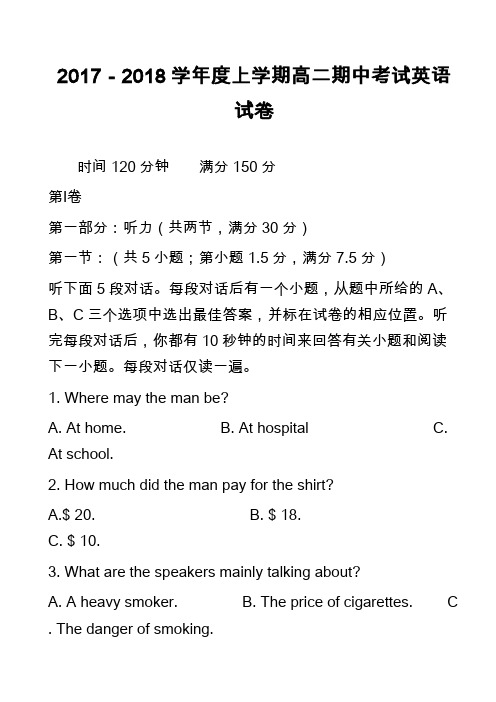
2017-2018学年度上学期高二期中考试英语试卷时间120分钟满分150分第Ⅰ卷第一部分:听力(共两节,满分30分)第一节:(共5小题;第小题1.5分,满分7.5分)听下面5段对话。
每段对话后有一个小题,从题中所给的A、B、C三个选项中选出最佳答案,并标在试卷的相应位置。
听完每段对话后,你都有10秒钟的时间来回答有关小题和阅读下一小题。
每段对话仅读一遍。
1. Where may the man be?A. At home.B. At hospitalC. At school.2. How much did the man pay for the shirt?A.$ 20.B. $ 18.C. $ 10.3. What are the speakers mainly talking about?A. A heavy smoker.B. The price of cigarettes. C . The danger of smoking.4. Which bus does the man want to take?A. No. 15.B. No. 36.C. No. 63.5. Where does the conversation probably take place?A. In the theater.B. In the shopping centre.C. A t the ticket office.第二节(共15小题;每小题1.5分,满分22.5分)听下面5段对话或独白。
每段对话或独白后有几个小题,从题中所给的A、B、C三个选项中选出最佳选项,并标在试卷的相应位置。
听每段对话或独白前,你将有时间阅读各个小题,每小题5秒钟;听完后,各小题将给出5秒钟的作答时间。
每段对话或独白读两遍.请听第6段材料,回答6、7题6. Why is the man unwilling to do some sports?A. He is too lazy.B. He was hurt in his leg.C. He wants to watch a football match.7. What will the woman probably do next?A. Watch TV at home.B. See the doctor with Peter.C. Do some exercise.请听第7段材料,回答8、9题。
2017-2018学年上学期高二英语期中考试卷
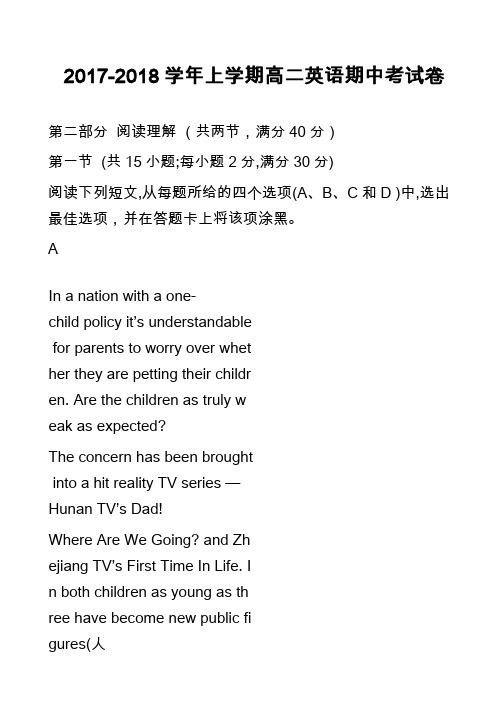
2017-2018学年上学期高二英语期中考试卷第二部分阅读理解(共两节,满分40分)第一节 (共15小题;每小题2分,满分30分)阅读下列短文,从每题所给的四个选项(A、B、C和D )中,选出最佳选项,并在答题卡上将该项涂黑。
AIn a nation with a one-child policy it’s understandablefor parents to worry over whether they are petting their children. Are the children as truly weak as expected?The concern has been broughtinto a hit reality TV series —Hunan TV’s Dad!Where Are We Going? and Zhejiang TV’s First Time In Life. In both children as young as three have become new public figures(人物). In the show First Time In Life,children chosen from ordinary families are given small tasks t o finish by themselves;the ongoing Dad show centers on five fathers and their childr en who are forced to live a sim ple life in poor villages far outs ide their comfortable city life. Though they have different fa mily backgrounds how they be have in the new environments has drawn the attention of the public.In Dad! Where Are We Going? the five-year-old daughter of former Olympi c diving champion Tian Liang cries and hides behind her fat her when they arrive at a rural village. In First Time In Life a y oung girl in Tianjin cries after being asked by her father to go out alone to buy eggs and a p ancake.In the eyes of some people th ese kids always depend on ot hers and the reason is that the ir parents give them too much love. But television viewers an d parents were encouraged w hen the crying Tianjin girl finall y returned holding the pancak e and Tian’s daughter finally b egan to take care of her young er friends and learned to ask f or help from people she didn’t know.The father of the Tianjin girl fel t “delightfully shocked” and sai d. “She used tobe well taken care of by her m other or grandmother. Now sh e has the courage to do it all b y herself. ”The shows have led many par ents to change how they raise their children. Shanghai mothe r Liang Jing said she would try to “give some training” to her shy son asking him to tidy up his toys. Lin Yi a parenting exp ert in Beijing said giving kids a chance to do things for thems elves helps to raise their sens e of success which carries ben efits all through their lives. ”21. What draws the people’s a ttention in the programs?A. How the children behave in the new environments.B. Where the children are from .C. What the kids’ family backg round is like .D. How old the children are.22. What is Tian Liang’s daug hter expected to do in the show?A. Go out to buy something al one.B. Live in a poor village with h er father.C. Make friends with strange p eople.D. Hide in a safe place out of danger.23. It can be known from the u nderlined words “delightfully s hocked” that ___.A. father is more important tha n mother in a familyB. children should be given a c hance to depend on themselv es.C. parents should give the chil d a safe environmentD. the children are as weak as parents expected24.The shows are bound to raise a wave of discussion that _______A. protecting good tradition B. the social societyC. approaches to parentingD. the influence of TV programmesBCassandra Feeley finds it hard to manage on her husband's i ncome.So this year she did something more than a hobby(业余爱好):She planted vegetables in her yard.For her first garden,Ms .Feeley has put in 15 tomato plants,and five rows of a variety of vegetables.The family's old farm house has become a chic ken house,its residents arriving next st year, Ms.Rita Gartin kept a small garden.This year she has made it much l arger because,she said,"The cost of everything is going up and I was looking to lose a few pounds,too;so it's a winwin situation all around."They are among the growing number of Americans who,dri ven by higher living costs and a falling economy(经济),have taken up vegetable gardening for the first time.Other s have increased the size of their existing gardens.Seed com panies and garden shops say that not since the 1970s has th ere been such an increase in interest in growing food at home .Now many gardens across the country have been sold out fo r several months.In Austin,Tex.,some of the gardens have a t hree year waiting list.George C.Ball Jr.,owner of a company,said sales of veget able seeds and plants are up by 40%over last year,double the average growth of the last five years.Mr.Ball argues that som e of the reasons have been building for the last few years.The big one is the striking rise in the cost of food like bread and m ilk, together with the increases in the price of fruits and vegeta bles.Food prices have increased because of higher oil prices. People are now driving less,taking fewervacations,so there is more time to garden.25.What does the word "residents" in Paragraph 1 probably refer to?A.chickens B.tomatoes C.gardens D.people26. By saying "a winwin situation all around",Ms.Gartin means that________.A.she is happier and her garden biggerB.she may spend less and lose weightC.she is selling more and buying lessD.she has grown more varieties of vegetables27.Why is vegetable gardening becoming increasingly popula r?A.More Americans are doing it for fun.B.The price of oil is lower than before.C.There's a growing need for fruits.D.The cost of living is on the rise.CWhile astronauts in space get to do many exciting things, they miss out on ordinary things that we all take for granted—being able to walk on firm ground, hanging out with family and digging into a slice of hot steaming pizza. Though not much c an be done about the first two things, there may soon be a sol ution to the third one, thanks to this cool 3-D pizza printer! About a year ago, NASA offered $125 ,000 to Anjan Contract or, a 3-D technology expert, to build a device (设备) that would allow astronauts to make pizza on demand. The mechanical engineer promised that his invention would prod uce pies in large quantities that looked, tasted and even smell ed like pizza made in common ovens.Late last year, the engineer presented a video of his first proto type (原型) that begins by creating a single slice of dough (面团) that is cooked and printed at the same time. Then comes t he tomato “sauce”— a mix of tomato powder, oil and water a nd finally, a protein slice that resembles cheese. While the vid eo doesn’t show the baking process, the inventor says that on ce the pizza is printed, it can be ready to be consumed in 7 se conds.While the pie in the video looks delicious enough to attract an y pizza lover, Anjan Contractor is far from ready for astronaut s. That’s because he still has to find a solution to make the fo od container in the printer last for 30 years. Though that may sound unrealistic, actually it is not.Anjan Contractor believes that the only way that is possible is that the water is removed from all the ingredients (配料) and then they are reduced to the powder form. This, as yo u can imagine, will not be so easy. But, while the printer may not be ready for space, it certainly looks ready enough for peo ple on earth. Hopefully, NASA and Contractor will consider sel ling it to those not fortunate enough to go to Mars!28. Why does the author mention the things that astronauts in space cannot do?A. To ask us not to take common things for granted.B. To show they live a difficult life there.C. To show their life is boring in space.D. To introduce the topic of the text.29.NASA offered $ 125, 000 to Anjan Contractor mainly to ___ ____.A. create some new type of 3-D printerB. attract more companies to work for NASAC. help astronauts in space enjoy fresh pizza one dayD. produce pizza in large quantities to earn great profits30.The biggest challenge that Anjan Contractor is faced with now is probably that _______.A. he has no money left to go on with his researchB. the pizza doesn’t seem appetizing to pizza loversC. he has no way to make pizza that can last for thirty yearsD. he cannot make the food container last for decades31. What’s the best title of the passage?A. NASA is trying its best to help astronauts eat betterB. Astronauts may soon be able to enjoy steaming hot pizzaC. NASA is working on making pizza for common peopleD. A 3-D pizza printer has been used to make pizzaDYou know how wonderful you are, and you know that others k now how wonderful you are, but what do you do when admirat ion crosses over the line into jealousy (嫉妒)? For most teens there will come a day when you realize th at one of your friends is jealous and that this jealousy is hurtin g your friendship. When this happens it can seem like there is nothing that you can do, but the good news is that there is. D on't let jealousy spoil your friendship. Deal with it confidently a nd you might be back to normal much sooner than you think. It can be hard to walk up to a friend and ask them what the pr oblem is, but if you want to save your friendship you'll have to do just that. Don't approach them and ask why they are jealou s of you unless of course you want to appear totally conceited (逞能的), just take some time alone with them and let them know th at you've been feeling like there's been something coming bet ween you. If they refuse to respond, then use the opportunitie s to explain how you have been feeling. Chances are that so mething you say will strike a nerve and your friend will open u p as well.When you figure out what is annoying your friend, ask him or her what (s)he thinks would make the situation better. If, for e xample, (s)he says that (s)he feels like (s)he doesn't get to sp end any time with you because of your being off with your ne w friends from the swim team then maybe you could invite hi m or her along the next time or block off one day a week for ju st the two of you. Remember, though, that whatever solution y ou decide on should be a compromise. Don't limit your own tal ents or opportunities simply because your friend is unhappy. Try instead to include him or her in your new life and see how that works out.Even the best of friendships can be ruined by jealousy. This d estructive emotion is rarely productive and can turn best frien ds into worst enemies. Before taking extreme action, chat with your jealous friend to see if the two of you can work out a co mpromise. If you can't, be prepared to know exactly how far y ou will go to keep your friend and how far you won't.32.According to the author, the jealousy emotion is ________.A.normalB.productiveC.destructiveD.ext reme33.What does the author intend to tell us in paragraph 2?A.How to solve the problem of jealousy.B.Why we need to solve the problem of jealousy.C.How to explain your jealousy to your friends.D.Why it is hard to deal with the problem of jealousy.34.What can be inferred from the last two paragraphs?A.There's always a solution to solve the problem of jealousy.B.Jealousy can turn best friends into worst enemies.C.You may lose a friend to keep your own gifts, chances or se lf development.D.You should go a long way with your friend to work out a sol ution.35.This passage is mainly intended for ________.A.female readersB.studentsC.teenagersD.b est friends阅读第二节(共5小题:每小题2分, 满分10分)根据短文内容,从短文后的选项中选出能填入空白处的最佳选项。
2017-2018学年高二英语上学期期中试题_82
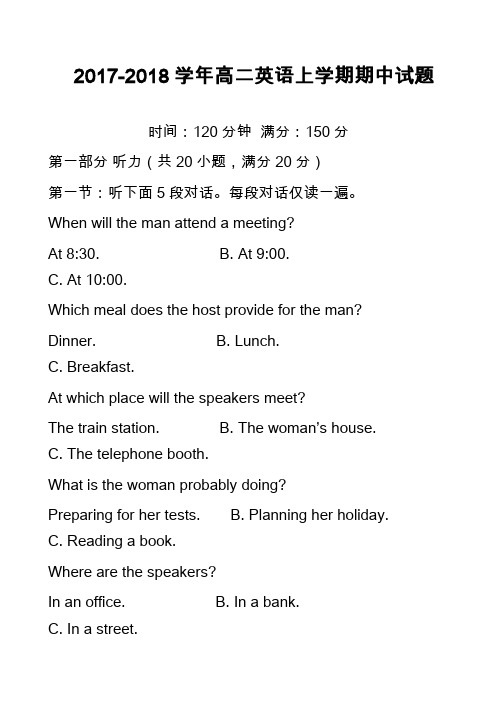
2017-2018学年高二英语上学期期中试题时间:120分钟满分:150分第一部分听力(共20小题,满分20分)第一节:听下面5段对话。
每段对话仅读一遍。
When will the man attend a meeting?At 8:30. B. At 9:00.C. At 10:00.Which meal does the host provide for the man?Dinner. B. Lunch.C. Breakfast.At which place will the speakers meet?The train station. B. The woman’s house.C. The telephone booth.What is the woman probably doing?Preparing for her tests. B. Planning her holiday.C. Reading a book.Where are the speakers?In an office. B. In a bank.C. In a street.第二节:听下面5段对话或独白。
每段对话或独白读两遍。
听第6段材料,回答6—7题。
6. What does the girl think of Spanish?A. It’s OK.B. It’s difficult.C. It’s boring.7. Which subject does the girl like best?A. Math.B. English.C. History.听第7段材料,回答8—9题。
8. What are the speakers mainly talking about?A. Unemployment.B. Future way of working.C. Home activities.9. What does the woman like doing at home?A. Sending friends e-mails.B. Doing housework.C. Watching TV.听第8段材料,回答10—12题。
2017-2018学年上高二年期中考试卷英语试卷
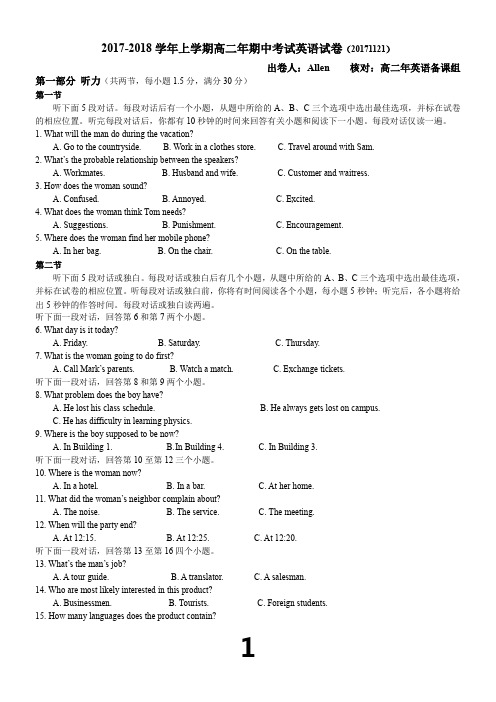
2017-2018学年上学期高二年期中考试英语试卷(20171121)出卷人:Allen 核对:高二年英语备课组第一部分听力(共两节,每小题1.5分,满分30分)第一节听下面5段对话。
每段对话后有一个小题,从题中所给的A、B、C三个选项中选出最佳选项,并标在试卷的相应位置。
听完每段对话后,你都有10秒钟的时间来回答有关小题和阅读下一小题。
每段对话仅读一遍。
1. What will the man do during the vacation?A. Go to the countryside.B. Work in a clothes store.C. Travel around with Sam.2. What’s the probable relationship between the speakers?A. Workmates.B. Husband and wife.C. Customer and waitress.3. How does the woman sound?A. Confused.B. Annoyed.C. Excited.4. What does the woman think Tom needs?A. Suggestions.B. Punishment.C. Encouragement.5. Where does the woman find her mobile phone?A. In her bag.B. On the chair.C. On the table.第二节听下面5段对话或独白。
每段对话或独白后有几个小题,从题中所给的A、B、C三个选项中选出最佳选项,并标在试卷的相应位置。
听每段对话或独白前,你将有时间阅读各个小题,每小题5秒钟;听完后,各小题将给出5秒钟的作答时间。
每段对话或独白读两遍。
听下面一段对话,回答第6和第7两个小题。
6. What day is it today?A. Friday.B. Saturday.C. Thursday.7. What is the woman going to do first?A. Call Mark’s parents.B. Watch a match.C. Exchange tickets.听下面一段对话,回答第8和第9两个小题。
17—18学年上学期高二期中考试英语试题(附答案)(6)
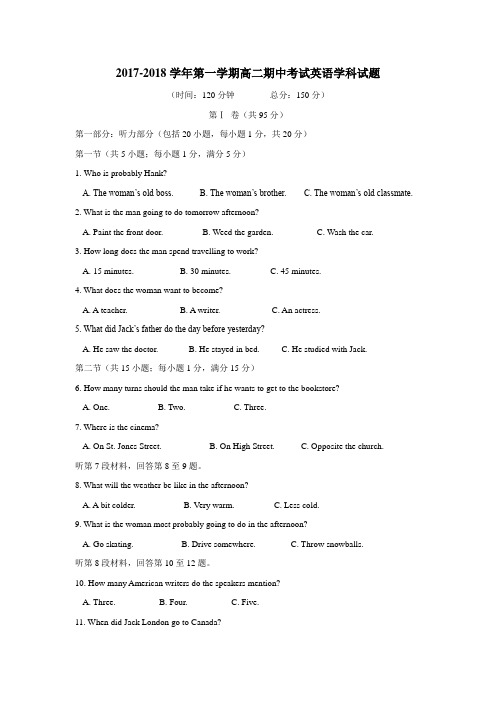
2017-2018学年第一学期高二期中考试英语学科试题(时间:120分钟总分:150分)第Ⅰ卷(共95分)第一部分:听力部分(包括20小题,每小题1分,共20分)第一节(共5小题;每小题1分,满分5分)1. Who is probably Hank?A. The woman’s old boss.B. The woman’s brother.C. The woman’s old classmate.2. What is the man going to do tomorrow afternoon?A. Paint the front door.B. Weed the garden.C. Wash the car.3. How long does the man spend travelling to work?A. 15 minutes.B. 30 minutes.C. 45 minutes.4. What does the woman want to become?A. A teacher.B. A writer.C. An actress.5. What did Jack’s father do the day before yesterday?A. He saw the doctor.B. He stayed in bed.C. He studied with Jack.第二节(共15小题;每小题1分,满分15分)6. How many turns should the man take if he wants to get to the bookstore?A. One.B. Two.C. Three.7. Where is the cinema?A. On St. Jones Street.B. On High Street.C. Opposite the church.听第7段材料,回答第8至9题。
浙江省临海市白云高级中学2017-2018学年高二上学期期中考试英语试题 Word版缺答案

白云高级中学2017学年第一学期期中试卷高二英语(考试时间:120分钟满分:100分)第一部分听力(共两节,满分20分)第一节(共5小题; 每小题1分, 满分 5分)听下面5段对话。
每段对话后有一个小题, 从题中所给的A、B、C三个选项中选出最佳选项, 并标在试卷的相应位置。
听完每段对话后, 你都有10秒钟的时间来回答有关小题和阅读下一小题。
每段对话仅读一遍。
1. Who is the man?A. A student.B. A salesman.C. A policeman.2. What does the woman think of the piano lessons?A. They are very boring.B. They are too expensive.C. They are very interesting3. How long does it take the man to drive home after 5 p. m. ?A. 35 minutes.B. 20 minutes.C. 15 minutes.4. What does the woman want to do?A. Cancel the meeting.B. Change the time of the meeting.C. Skip the meeting.5. Where does the conversation probably take place?A. In a hotel.B. At a bus station.C. At an airport.第二节(共15小题; 每小题1分, 满分15分)听下面5段对话或独白。
每段对话或独白后有几个小题, 从题中所给的A、B、C三个选项中选出最佳选项, 并标在试卷的相应位置。
听每段对话或独白前, 你将有时间阅读各个小题, 每小题5秒钟; 听完后, 各小题将给出5秒钟的作答时间。
2017-2018学年高二英语上学期期中试题_1

2017-2018学年高二英语上学期期中试题Ⅰ卷第一部分听力第一节(共5小题;每小题1分,满分5分)听下面5段对话,每段对话仅读一遍。
1. What does the man plan to do tonight?A. Go dancing.B. Do some writing.C. Do some reading.2.What color gloves does the woman like?A. Green.B. Yellow.C. Blue.3.How much money will the man lend to the woman?A. $5.B.$15.C. $20.4.What did the woman think was a bit too salty?A. The fish.B. The beef.C. The soup.5.What time is it now?A. 9:30 pm.B. 10:00 pm.C. 10:30 pm.第二节(共15小题;每小题1分,满分15分)听下面5段对话或独白。
每段对话或独白读两遍。
听第6段材料,回答第6至7题。
6. Why does the man call the woman?A. To book a room.B. To confirm a room.C. To change a room.7.Which room will the man take?A. Room 13.B. Room 19.C. Room 26.听第7段材料,回答第8至9题。
8.Who is the man waiting for?A. The doctor.B. Some patients.C. The repairman.9.When does the conversation probably take place?A. In the morning.B. In the afternoon.C. In the evening.听第8段材料,回答第10至12题。
2017-2018学年高二上学期期中考试英语 试题 word版

2017-2018学年高二上学期期中考试高二英语试卷第一部分听力(共两节,满分30分)第一节(共5小题;每小题1.5分,满分7.5分)听下面5段对话。
每段对话后有一个小题,从题中所给的A、B、C三个选项中选出最佳选项,并标在试卷的相应位置。
听完每段对话后,你都有10秒钟的时间来回答有关小题和阅读下一小题。
每段对话仅读一遍。
1.What does the man want to do?A.Fly a kite.B.Go to the park.C.Play on the lnternet.2.What will the girl buy this evening?A.Sunglasses.B.A scarf.C. Gloves.3.What does the man suggest the woman do?A. Take a taxi.B.Walk to the hotel.C.Ask someone else for help.4.Who is the woman probably?A.A hotel clerk.B.A police officer.C.The man’s wife.5.What are the speakers mainly talking about?A.A birthday partyB.New Year’s giftsC.The man’s parents第二节(共15小题;每小题1.5分,满分22.5分)听下面5段对话或独白。
每段对话或独白后有几个小题,从题中所给的A、B、C三个选项中选出最佳选项,并标在试卷的相应位置。
听每段对话或独白前,你将有时间阅读各个小题,每小题5秒钟;听完后,各小题将给出5秒钟的作答时间。
每段对话或独白读两遍。
听第6段材料,回答第6、7题。
6.How does the man probably feel?A.Excited.B.Nervous.C.Regretful.7.What will the man do next?A.Talk to Samantha.B.Dance with the woman.C.Attend a graduation ceremony.听第7段材料,回答第8、9题。
2017-2018学年高二英语上学期期中试题_50
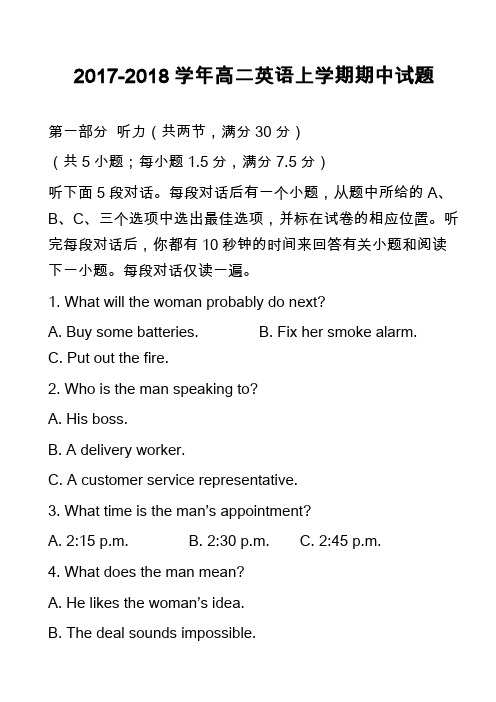
2017-2018学年高二英语上学期期中试题第一部分听力(共两节,满分30分)(共5小题;每小题1.5分,满分7.5分)听下面5段对话。
每段对话后有一个小题,从题中所给的A、B、C、三个选项中选出最佳选项,并标在试卷的相应位置。
听完每段对话后,你都有10秒钟的时间来回答有关小题和阅读下一小题。
每段对话仅读一遍。
1. What will the woman probably do next?A. Buy some batteries.B. Fix her smoke alarm.C. Put out the fire.2. Who is the man speaking to?A. His boss.B. A delivery worker.C. A customer service representative.3. What time is the man’s appointment?A. 2:15 p.m.B. 2:30 p.m.C. 2:45 p.m.4. What does the man mean?A. He likes the woman’s idea.B. The deal sounds impossible.C. He has some questions to ask.5. What will the man wear?A. A blue shirt.B. White shoes.C. A brown jacket.(共15小题;每小题1.5分,满分22.5分)听下面5段对话或独白。
每短对话或独白后有几个小题,从题中所给的A、B、C、三个选项中选出最佳选项,并标在试卷的相应位置。
听每段对话或独白前,你将有时间阅读各个小题,每小题5秒钟;听完后,各小题将给出5秒钟的作答时间。
每段对话或独白读两遍。
听下面一段对话,回答第6至7题。
6. What do we know about the man?A. He is good at marathon.B. He just ran a marathon.C. He’s a beginner runner.7. What does the man decide to do in the end?A. Go to the gym.B. Give up his idea.C. Exercise outdoors.听下面一段对话,回答第8至9题。
2017-2018学年上学期高二年级期中考试英语试卷_1

2017-2018学年上学期高二年级期中考试英语试卷(试卷满分为140分,考试时间为120分钟)第一卷(三部分,共105分)第一部分:听力理解(共三节,30分)第一节(共5小题;每小题1. 5分,满分7. 5分)听下面5段对话。
每段对话后有一个小题,从题中所给的A、B、C三个选项中选出最佳选项,并标在试卷的相应位置。
听完每段对话后,你都有10秒钟的时间来回答有关小题和阅读下一小题。
每段对话仅读一遍。
1. What can we know about the woman?A. She hasn't seen the movie.B. She will buy the tickets.C. She likes the actors a lot.2. What is the relationship between the two speakers?A. Mother and son.B. Sister and brother.C. Wife and husband.3. Why couldn't the man find Dr. White?A. He forgot the right number.B. He dialed a different number.C. He was making a joke.4. How much will the woman pay for the peach?A. 2. 5 yuan.B. 5 yuan.C. 10 yu an.5. What does the woman need?A. Something to drink.B. Something to eat.C. Something to ask for.第二节(共10小题;每题1. 5分,满分15分)听下面4段对话或独白。
每段对话或独白后有几个小题,从题中所给的A、B、C三个选项中选出最佳选项,并标在试卷的相应位置。
- 1、下载文档前请自行甄别文档内容的完整性,平台不提供额外的编辑、内容补充、找答案等附加服务。
- 2、"仅部分预览"的文档,不可在线预览部分如存在完整性等问题,可反馈申请退款(可完整预览的文档不适用该条件!)。
- 3、如文档侵犯您的权益,请联系客服反馈,我们会尽快为您处理(人工客服工作时间:9:00-18:30)。
白云高级中学2017学年第一学期期中试卷高二英语(考试时间:120分钟满分:100分)第一部分听力(共两节,满分20分)第一节(共5小题; 每小题1分, 满分 5分)听下面5段对话。
每段对话后有一个小题, 从题中所给的A、B、C三个选项中选出最佳选项, 并标在试卷的相应位置。
听完每段对话后, 你都有10秒钟的时间来回答有关小题和阅读下一小题。
每段对话仅读一遍。
1. Who is the man?A. A student.B. A salesman.C. A policeman.2. What does the woman think of the piano lessons?A. They are very boring.B. They are too expensive.C. They are very interesting3. How long does it take the man to drive home after 5 p. m. ?A. 35 minutes.B. 20 minutes.C. 15 minutes.4. What does the woman want to do?A. Cancel the meeting.B. Change the time of the meeting.C. Skip the meeting.5. Where does the conversation probably take place?A. In a hotel.B. At a bus station.C. At an airport.第二节(共15小题; 每小题1分, 满分15分)听下面5段对话或独白。
每段对话或独白后有几个小题, 从题中所给的A、B、C三个选项中选出最佳选项, 并标在试卷的相应位置。
听每段对话或独白前, 你将有时间阅读各个小题, 每小题5秒钟; 听完后, 各小题将给出5秒钟的作答时间。
每段对话或独白读两遍。
听第6段材料,回答第6、7题。
6. What is special about the meal?A. The amount of food.B. The price of food.C. The kind of food.7. What does the man suggest the woman do?A. Try a dessert.B. Try his favorite meat.C. Eat as much as possible.听第7段材料,回答第8、9题。
8. What does the woman often do in her free time?A. Listen to music.B. Go camping.C. Visit beautiful places.9. Why are the two speakers going out together this weekend?A. For a photo class.B. For a photography exhibit.C. For taking some pictures.听第8段材料,回答第10-12题。
10. What do you think Robert is?A. A dancer.B. A student.C. A singer.11. Where will the group perform?A. At concert halls.B. At restaurants.C. At some parties.12. Why is Robert not sure of joining the group?A. He doesn’t think he is go od enough.B. He doesn’t have time to practice.C. He isn’t interested in joining it.听第9段材料,回答第13-16题。
13. What is the woman doing?A. Doing a survey.B. Promoting a magazine.C. Advertising for travel agency.14. Which age group does the man belong to?A. The young.B. The mid-aged.C. The old.15. What are the man and his wife’s common interests?A. Exercising and watching movies.B. Sailing and watching movies.C. Cooking and visiting friends.16. What is the probable relationship between the two speakers?A. Boss and clerk.B. Teacher and student.C. Interviewer and interviewee.听第10段材料,回答第17-20题。
17. Why can’t the far north use the sun for a clock?A. The sun there never goes down in winter.B. It’s t oo cold for people to go out.C. There are long dark winters and long light summers.18. How can the people living near the sea tell time?A. From the tide.B. From the beach.C. From the sand.19. What is seamen’s clock?A. The stars.B. The whole sky.C. The moon.20. What is the speaker talking about?A. Useful machines to tell time.B. Different ways to tell time.C. The history of the clock.第二部分阅读理解(共两节,满分25分)第一节(共10小题;每小题2分,满分20分)阅读下列短文,从每题所给的A、B、C和D四个选项中,选出最佳选项。
AA 16-year-old student has won a televised Chinese poetry competition, winning fans over with her keen knowledge of the country’s ancient culture and works.Wu Yishu, a student at the High School Affiliated(隶属的)to Fudan University in Shanghai, beat other competitors in the second season of the Chinese Poetry Conference on China Central Television on Feb. 7.“I get feelings from ancient poetry that modern people cannot give me. I pay little attention to the competition result, but I love poetry, and it is enough as long as I enjoy the happiness brought by the poetry, ”Wu said.In the final, Wu performed strongly in many sections, such as competitors recalling poems by looking at sand paintings and reciting poems as many as they could think of relating to the Chinese character“Jiu, ”meaning liquor.As early as Feb. 1, when Wu recited an ancient Chinese poem about the months of the year, the judges estimated that Wu must have remembered more than 2, 000 Chinese ancient works.Wu’s strong performance in the Chinese ancient rhythm works earned her many fans and inspired others to learn ancient works.The 1. 8-meter tall Wu said that she kept only one ancient poetry book on bookshelves at her dormitory room instead of other books such as math, physics and chemistry books that her classmates have kept on their bookshelves.She is known among her classmates and teachers as she loves reading poetry and wearing ancient Chinese clothes.Zhou Hong, a professor from the Department of Chinese language and literature of East China Normal University, said that he had read some of the girl’s poetry in 2015, and had published some on his blog.21. What does the passage mainly talk about?A. Wu Yishu, a student of a high school, loves ancient poetry very much.B. A student of a high school attended a poetry competition.C. A 16-year-old student wins Chinese ancient poetry competition.D. Wu Yishu’s performance in the competition earned her many fans.22. What does Wu Yishu think of the poetry according to her words?A. The poetry can give her an honour.B. The poetry can bring her happiness.C. The poetry can help her know how to love.D. The poetry can help her to win.23. According to the passage, we can infer______.A. Wu has remembered more than 2, 000 Chinese ancient worksB. her excellent performance in the poems earned her many fansC. Wu loves reading poetry and wearing ancient Chinese clothesD. many people have begun to become interested in learning ancient works because of WuBIn 2012, I had just recovered from a serious illness when I received an invitation to a writer’s conference in Orlando, Florida. My family and friends persuaded me that a holiday might be just what the doctor ordered, so off I went.Arriving in the Sunshine State was not easy, but I managed to catch a taxi to the hotel. The next morning, I caught another taxi to do some shopping. Later I went to a café to buy some lunch, but having my sandwich and drink in my hands, I saw that all the tables were occupied(占用). Then I heard a friendly voice saying, “You can share my table. ”I thankfully sat down with the smiling elderly lady and we shared a happy lunch together. As the meal drew to a close she asked how long I would be in Orlando. I had already told her that I hadn’t hired(租用)a car, and hadn’t realized how costly taking taxis would be. After a while she said, “My dear, don’t use any more taxis. It would be my pleasure to drive you wherever you wish. ”I told her that I couldn’t put he r to that trouble, but she insisted. She took details of where I was staying and the next morning she drove me to Disney World. She took me through the park’s gates and spent some time with me before leaving meto explore alone. At the end of the day, she returned to take me back to my hotel. The next few days, she drove me around Orlando’s tourist areas. I offered her money but she refused to take any.When we had lunch on my last day, I thanked her for her kindness. I’ll never forget that wonderful lady who filled my holiday in Florida with wonderful memories.24. The author went to Orlando to________.A. see a doctorB. attend a meetingC. meet a friendD. visit a family member25. What did the elderly lady do?A. She offered her seat to the author.B. She helped the author hire a car.C. She drove the author to a park.D. She bought the author a lunch.26. We can infer from the text that the elderly lady is________.A. hard-workingB. good-lookingC. well-knownD. kind-heartedCToday, the technology that is being developed for cell phones is surprising. Soon our cell phones will be able to do things that we thought impossible or not even thought of at all.When picturing the future, there are quite a few things that we would love our cell phones to be able to do. Let’s take a look at the ones that are likely to be in the next generation of cell phones. Cell phones of the near future will be able to start and unlock cars, turn lights on and off in houses, make payments(付款), work as computers. This sounds too good to be true, right? Fortunately, this future is just over the horizon; you won’t wait too long. New technology for phones is beingdeveloped to realize eye scans(扫描)and fingerprint scans as n ew“unlock your phone”, so you needn’t worry about your information being stolen.What do I want my phone to be able to do? I want it to be special. For example, I will shout to my phone across the room“Give me directions to the market”and it pulls up the directions and sends them to my printer. Is it possible? Yes. Maybe someday cell phones will be able to change into robots and walk our dogs and clean our houses too. Who knows? In the last 30 years we have gone from hardly knowing what a cell phone was to surfing the Internet with excellent cell phones.It is hard to believe that technology is advancing as quickly as it is, with no end in sight. In 5 years the technology of today will be a thing of the past, and the world won’t look back one bit.27. We learn from the text that cell phones________in the future.A. can do a number of jobs you want it to doB. only do the work we once thought ofC. don’t look like today’s cell phones at allD. can pay for whatever you want to buy28. The underlined phrase“over the horizon”in Paragraph 2 can be replaced by“________”.A. arriving as time goesB. what people all hopeC. what we work hard forD. coming in a short time29. If one’s eye scan is done by his cell phone, ________.A. his picture is kept in it foreverB. his information won’t be lostC. his cell phone only serves himD. his cell phone won’t be stolen30. What is special about your future cell phone?A. It works as a robot does.B. You can speak loudly to it.C. It can give you information.D. It can warn you out of danger.第二节(共5小题;每小题1分,满分5分)根据短文内容, 从短文后的选项中选出能填入空白处的最佳选项。
